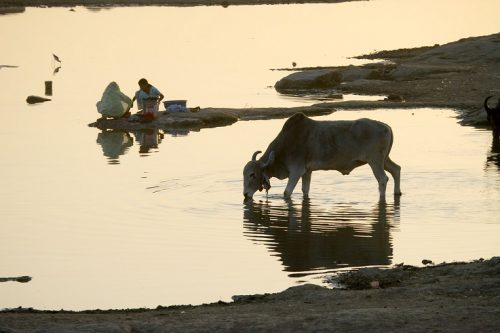With This Low-Cost Arsenic Water Filter, an IIT Kharagpur Professor Wants to Helps Lakhs of Indians
This filter stands to help a total of 22 lakh people across India at risk of being affected by arsenic-contaminated water.

In 2004, Sirshendu De, a professor at Indian Institute of Technology (IIT), Kharagpur, started to work towards saving those from underprivileged backgrounds in West Bengal from drinking groundwater with arsenic contamination.
He went about creating a low-cost filter that stands to help over 22 lakh people across India who would otherwise be affected by arsenic-contaminated water.

Image for representation. Photo source
Professor De was at hand to demonstrate his filter at Festival of Innovation organised by the office of the president between March 4 and 10. While he had initially developed the filter as an answer to West Bengal’s arsenic contamination, now 10 states in India, including Bihar, Jharkhand, Assam and Manipur face the same problem. Long-term exposure to arsenic contamination can cause skin problems and sometimes even lead to cancer.
His breakthrough innovation has been universally hailed. Speaking to India Today in 2016 about his project, he said, “We realised that the arsenic problem was emerging in some districts, including Murshidabad, North 24 Parganas and South 24 Parganas due to the nature of soil which was gangetic alluvial soil. However, districts like Midnapore, Purulia and Bankura were rocky laterite in nature, that works as a natural protection against arsenic content.”
The professor looked to nature for the answers and built the filter using laterite content, and was able to filter out the arsenic content in the water. The innovation, which is priced at ₹4,000, treats about 100 litres of water in a day and lasts for a period of five years.
You may also like: This Low-Cost Technology Is Helping a Puducherry Village Treat Its Wastewater, and It Uses Plants!
However, this breakthrough is not something De states he was able to pull off by himself. In interviews, he humbly notes that his students helped him at every step, including with the design of the filter. And now hopefully lakhs of Indians have access to clean water as a result.
Professor Sirshendu De can be contacted here
Like this story? Or have something to share? Write to us: [email protected], or connect with us on Facebook and Twitter.
NEW: Click here to get positive news on WhatsApp!

Similar Story

India’s First Vertical Sea Bridge: 8 Things To Know About the New Pamban Bridge
As India’s first vertical lift railway sea bridge, the new Pamban Bridge, is set to reach completion by March next year, here’s some facts you should know about this technological marvel, which connect Rameswaram to mainland India.
Read more >
If you found our stories insightful, informative, or even just enjoyable, we invite you to consider making a voluntary payment to support the work we do at The Better India. Your contribution helps us continue producing quality content that educates, inspires, and drives positive change.
Choose one of the payment options below for your contribution-
By paying for the stories you value, you directly contribute to sustaining our efforts focused on making a difference in the world. Together, let's ensure that impactful stories continue to be told and shared, enriching lives and communities alike.
Thank you for your support. Here are some frequently asked questions you might find helpful to know why you are contributing?


This story made me
-
97
-
121
-
89
-
167












